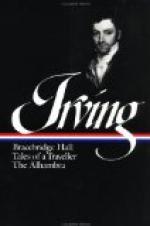He clasped the white hand that had been laid within his, put his arm round her slender waist, and drawing her fondly to his bosom—“This night at least,” said he, “we’ll pass at Terracina.”
Crack! crack! crack! crack! crack!
Another apparition of the road attracted the attention of mine host and his guests. From the road across the Pontine marshes, a carriage drawn by half a dozen horses, came driving at a furious pace—the postillions smacking their whips like mad, as is the case when conscious of the greatness or the munificence of their fare. It was a landaulet, with a servant mounted on the dickey. The compact, highly finished, yet proudly simple construction of the carriage; the quantity of neat, well-arranged trunks and conveniences; the loads of box coats and upper benjamins on the dickey—and the fresh, burly, gruff-looking face at the window, proclaimed at once that it was the equipage of an Englishman.
“Fresh horses to Fondi,” said the Englishman, as the landlord came bowing to the carriage door.
“Would not his Excellenza alight and take some refreshment?”
“No—he did not mean to eat until he got to Fondi!”
“But the horses will be some time in getting ready—”
“Ah.—that’s always the case—nothing but delay in this cursed country.”
“If his Excellenza would only walk into the house—”
“No, no, no!—I tell you no!—I want nothing but horses, and as quick as possible. John! see that the horses are got ready, and don’t let us be kept here an hour or two. Tell him if we’re delayed over the time, I’ll lodge a complaint with the postmaster.”
John touched his hat, and set off to obey his master’s orders, with the taciturn obedience of an English servant. He was a ruddy, round-faced fellow, with hair cropped close; a short coat, drab breeches, and long gaiters; and appeared to have almost as much contempt as his master for everything around him.
In the mean time the Englishman got out of the carriage and walked up and down before the inn, with his hands in his pockets: taking no notice of the crowd of idlers who were gazing at him and his equipage. He was tall, stout, and well made; dressed with neatness and precision, wore a travelling-cap of the color of gingerbread, and had rather an unhappy expression about the corners of his mouth; partly from not having yet made his dinner, and partly from not having been able to get on at a greater rate than seven miles an hour. Not that he had any other cause for haste than an Englishman’s usual hurry to get to the end of a journey; or, to use the regular phrase, “to get on.”
After some time the servant returned from the stable with as sour a look as his master.
“Are the horses ready, John?”
“No, sir—I never saw such a place. There’s no getting anything done. I think your honor had better step into the house and get something to eat; it will be a long while before we get to Fundy.”




